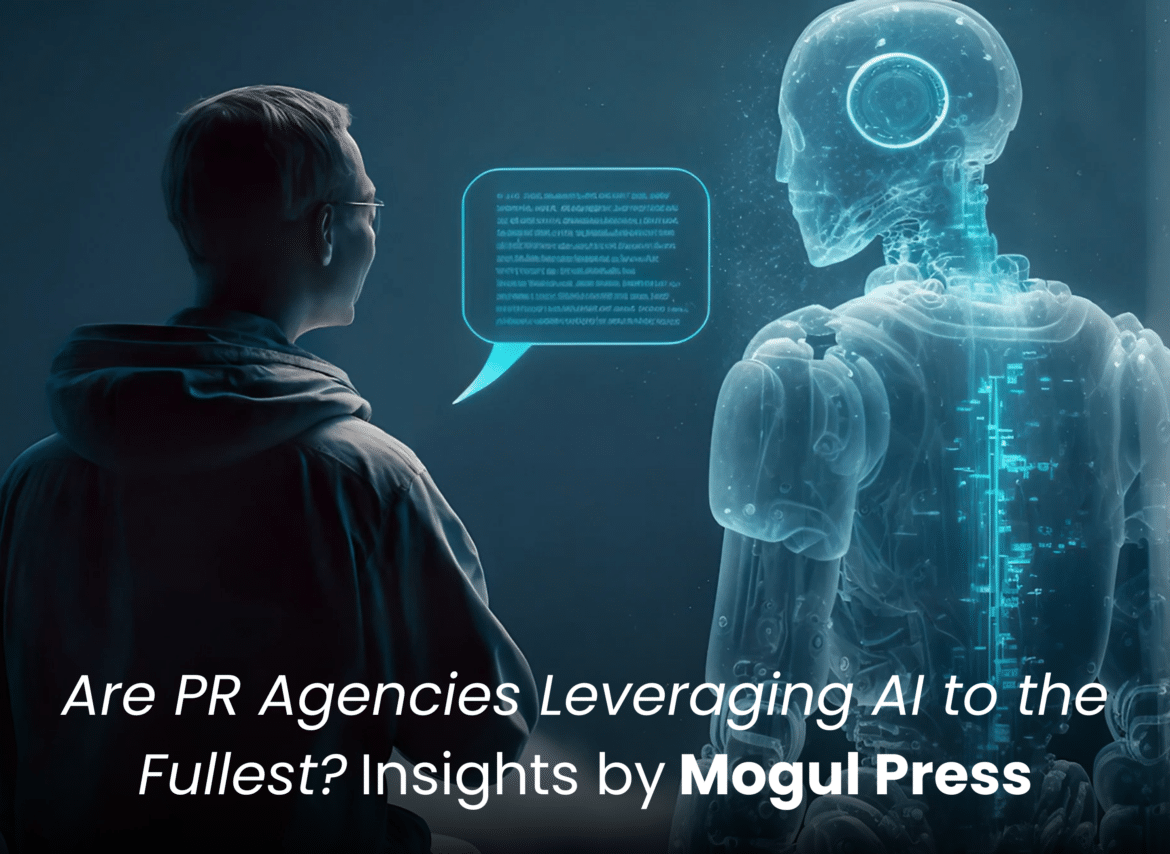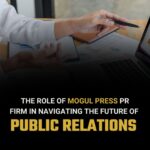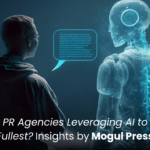Harness the power of AI in Public Relations: Discover cutting-edge trends and master the art of integrating AI into PR tactics of the best PR agencies to elevate their impact and innovation.
In the rapidly evolving field of public relations (PR), artificial intelligence (AI) is starting to materialize; it is no longer just a futuristic notion. As we get closer to 2024, the best PR agencies including those with global operations are not only embracing AI to transform their operations, strategies, and client outcomes, but they are also leading this trend.
This revolutionary change is driven by efficiency, accuracy, and personalization all made possible by AI in ways never seen before.
In the formerly human-dominated field of public relations, artificial intelligence (AI) technologies are opening up new avenues for creativity, analysis, and involvement. For the best PR agencies as well as international PR agencies, it is redefining what it means to run successful PR campaigns by automating repetitive chores and offering in-depth analyses of audience behavior and media trends.
The Future of PR: Balancing AI’s Potential with Ethical Challenges
The ramifications of this integration are extensive; it offers insight into a future where PR agencies will be able to anticipate trends, craft messages with unmatched precision, and interact more deeply and personally with audiences.
However, there are difficulties and moral dilemmas with utilizing AI in public relations, even for the most prestigious and international PR agencies. Agency concerns regarding data privacy, AI-generated content integrity, and the possible loss of human touch in communications surface as they traverse this new ground. The potential advantages of AI for public relations companies and their clients outweigh these worries.
The rise of AI in public relations
Artificial Intelligence (AI) is a disruptive force in the rapidly evolving field of public relations, bringing in a new era of creativity and tactics. To stay ahead of the competition and provide efficiency, personalization, and insights that more traditional approaches could not provide, the best PR agencies are turning more and more to artificial intelligence.
AI integration is a need for any international PR agency hoping to deliver unmatched service and outcomes because this is not just a trend but a fundamental change in the way public relations functions.
Understanding AI’s impact on PR
Fundamentally, artificial intelligence is a collection of technologies that can process massive amounts of data, mimic human intelligence, and make decisions on their own. Its unparalleled precision and personalization in analyzing, forecasting, and managing public perceptions and media relationships is what makes it so valuable in public relations.
In the past, AI has been incorporated into public relations gradually, starting with simple analytics to gauge the effectiveness of campaigns. But as it became evident how powerful AI was at turning data into useful insights, the scene quickly shifted. AI-powered tools that could create content, analyze sentiment, and monitor media in real-time emerged during this evolution, marking a major shift from conventional PR techniques.
The most successful PR agencies were quick to recognize that utilizing AI could improve workflows and give them a competitive edge when creating customized, powerful communication campaigns.
Key factors driving AI adoption in PR agencies
The best PR agencies are embracing AI for several reasons, including greater productivity and efficiency. AI frees up professionals to focus on strategic and creative work by automating repetitive tasks like media monitoring and report generation. Enhanced productivity and the capacity to oversee several clients or campaigns concurrently are the results of workflow optimization.
Furthermore, the incorporation of AI into PR is built upon enhanced data analysis and insights. AI systems can sort through enormous volumes of data quickly to spot trends, forecast media attention, and evaluate the effectiveness of campaigns. With this capacity, agencies can quickly make decisions based on data and customize their approaches to optimize engagement and return on investment.
Enhancing Engagement and Loyalty in Modern PR
Scalable personalization is an additional crucial factor. AI gives the best PR agencies the tools they need to better segment their audiences and personalize messaging so that it resonates with each individual in the digital age, where audiences expect tailored content. This raises brand loyalty and credibility in addition to engagement rates.
Taken together, these elements show why the top PR agencies are utilizing AI. By boosting productivity, utilizing profound insights, and personalizing communication on a never-before-seen scale, it is establishing the foundation for the future of public relations.
How AI is revolutionizing PR strategies
Artificial Intelligence (AI) is a game-changer in the dynamic field of public relations. It is reshaping the industry with cutting-edge tools and tactics that distinguish the best PR agencies.
The way PR professionals approach media monitoring, content creation, and audience engagement is changing dramatically as a result of AI’s ability to analyze data, predict outcomes, and personalize content.
The best PR agencies can now respond with never-before-seen speed and accuracy, in addition to being able to anticipate the needs and reactions of their audiences, thanks to this extensive transformation.
AI in media monitoring and analysis
The monitoring and analysis of media is one of the most important uses of AI in PR. Artificial intelligence (AI)-powered systems that can track brand mentions in real-time across a variety of digital platforms are replacing manual and labor-intensive traditional methods.
These systems filter through news articles, online forums, and social media posts using complex algorithms to deliver real-time notifications of brand mentions. PR specialists can better manage brand reputation by promptly assessing public opinion and responding appropriately thanks to this real-time capability.
AI is superior to tracking in sentiment analysis, using natural language processing to ascertain the context and tone of brand mentions. The best PR agencies can now create responses that truly speak to their audience’s sentiments thanks to this analysis, which provides a nuanced understanding of public perception.
Furthermore, crisis management relies heavily on predictive analytics. AI can anticipate possible PR crises before they worsen by examining trends and patterns in data, giving agencies advance notice to plan and carry out mitigation measures. Predictive ability is crucial for preserving a brand’s reputation and public confidence.
AI-driven content creation and distribution
The use of AI in PR for content creation and distribution is another ground-breaking feature. International PR agencies can now create relevant, high-quality content in a fraction of the time it would take to do it by using AI-powered content generation tools and automated press release systems.
These tools can produce timely and interesting content by analyzing data on audience preferences and trending topics. The personalization of messages is also automated, guaranteeing that the content appeals to the intended audience and amplifying the effect of PR campaigns.
AI has a significant impact on social media management as well, helping with content distribution optimization, targeting, and scheduling. The best times to post can be found by algorithms, guaranteeing a high level of visibility and interaction.
Moreover, AI-powered analytics solutions provide perceptions of the behavior of audiences, allowing PR specialists to improve their campaign efficacy and targeting tactics. Since this degree of optimization was previously unachievable, artificial intelligence (AI) is an invaluable tool for any PR agency seeking to excel in the digital era.
Personalization and audience engagement
Personalization is the cornerstone of contemporary PR strategy, and AI shines in this area. The best PR agencies use AI to personalize communication plans for a range of audiences, making sure that messages are suited to the distinct tastes and concerns of each group.
This strategy encourages a closer bond between brands and their audiences, in addition to increasing engagement rates. PR pros can create messages that speak directly to the individual by using AI to analyze user data and find patterns and preferences. This raises the bar for personalized communication.
Enhancing User Experience in PR with AI
Another important application of AI in PR is improving the user experience, especially with chatbots and virtual assistants. These AI-powered solutions engage audiences instantly and around the clock, providing personalized answers to questions, encouraging participation, and obtaining insightful feedback. In addition to enhancing customer service, this interaction gathers information that can be used to further customize and improve subsequent communications.
In conclusion, there are many advantages to incorporating AI into PR strategies, ranging from improved media monitoring and predictive analytics to advanced personalization and automated content creation. The best PR agencies are reaching new heights thanks to these innovations, which allow them to better manage brand reputations, engage audiences more deeply and foresee crises before they arise. AI’s role in PR is expected to grow even more crucial as it develops, highlighting how crucial it is that PR professionals embrace this technological revolution.
Challenges and considerations
As artificial intelligence (AI) becomes more and more ingrained in PR strategies, the best PR agencies are now dealing with a new set of obstacles. Even though AI has many advantages, there are still obstacles to its widespread adoption.
These obstacles mainly involve privacy issues, ethical considerations, and balancing automation with human interaction. Additionally, agencies trying to maintain leadership in the PR sector face formidable challenges. These include financial and technological limitations.
Navigating ethical implications
The main ethical issues raised by AI in PR are those related to data security and privacy. The need to protect sensitive data grows as the best PR agencies depend more and more on AI to gather and examine massive volumes of data. In addition to being purely legal matters, privacy concerns are fundamentally based on public trust in agencies and the clients they serve.
Balancing Data Security and Authenticity in Modern Public Relations
Data breaches or improper handling can seriously harm one’s reputation, undermining the main objectives of public relations campaigns. The best PR agencies must implement robust data protection measures and adhere to ethical standards to ensure that privacy is respected and maintained.
Another crucial ethical factor in communications is keeping the human element and authenticity intact. The increasing sophistication of AI technologies poses a risk to authenticity, as automated content may eventually blend in with human-generated content. International PR agencies understand that while AI can improve personalization and efficiency, true human connection and understanding are the foundation of PR.
By balancing AI’s potential with a dedication to genuineness, communications are kept relatable and reliable, enhancing the agency’s credibility and the importance it places on human-led strategies.
Overcoming technical and financial barriers
For many PR agencies, investing in AI technology and training is a major barrier. Adopting the newest AI tools comes with significant upfront costs, both for the technology itself and for staff training on how to use the new systems.
The best PR agencies see these costs as investments in their future achievements and devote resources to developing their staff’s skills and incorporating cutting-edge AI tools. This is not without difficulties, though, as the rapid advancement of technology demands constant investment in both professional development and technology updates.
Another technical challenge that agencies face is integration with pre-existing PR strategies and tools. The most effective PR campaigns combine cutting-edge AI capabilities with conventional techniques in a seamless way, resulting in a unified strategy that makes the most of each.
To ensure that AI tools enhance current procedures rather than replace them, this integration calls for meticulous planning and customization. International PR agencies shine in this domain, showcasing a capacity to modify and develop their approaches to incorporate AI, consequently augmenting their service provisions and campaign efficiency.
Investment in AI technology and training
Artificial intelligence technology can come with a significant upfront cost as well as ongoing training costs. The best PR agencies view this investment as a strategic move that will help them stay ahead of the competition and future-proof their business. It goes beyond just making a financial decision.
The expense of purchasing AI platforms, software, and tools is merely the beginning. A large amount of money is also spent on teaching employees how to use these technologies effectively. By making this dual financial commitment, agencies can be sure that they are not only buying tools but also providing their staff with the training and resources they need to use AI efficiently.
Leading PR agencies understand the value of ongoing education and adjustment in an environment where artificial intelligence is constantly changing. They set aside funds for continuing education in addition to the initial purchase and training to make sure their staff is competent in utilizing the rapidly advancing AI technologies. This strategy, which sees the expense as an investment in the agency’s and its clients’ future success, helps to mitigate one of the main financial obstacles.
Integration with existing PR tools and strategies
A major obstacle is the technical difficulty of integrating AI with current PR tactics and tools, which goes beyond the financial investment. The best PR agencies tackle this problem strategically, trying to combine AI with conventional PR techniques in a natural way. A detailed analysis of the current procedures and a precise grasp of how AI can improve or simplify these activities are necessary for this integration.
The idea is to create a hybrid model that combines the best aspects of both worlds rather than trying to replace conventional PR tools, but rather to improve them with AI’s capabilities. Leading PR agencies frequently take the lead in innovation, demonstrating how AI can enhance current tactics. Examples include employing predictive analytics for more targeted campaigns or automating repetitive tasks to free up personnel for more creative and strategic work.
Finally, a forward-thinking strategy that sees these obstacles as chances for development and innovation is needed to surmount the financial and technical obstacles related to AI in PR. The best PR agencies are aware that to stay at the forefront of the field and provide their clients with outstanding results, they must invest in AI technology and training in addition to carefully integrating AI into their current strategies.
The future of AI in PR
Future developments in artificial intelligence (AI) will undoubtedly have an impact on public relations, creating new opportunities for the industry to expand. The most innovative PR agencies are already at the forefront of examining these new trends and technologies to capitalize on AI’s revolutionary potential.
Looking ahead, the incorporation of advanced metrics for calculating PR ROI and predictive AI models stand out as significant advancements influencing the direction of public relations.
Emerging trends and technologies
The use of predictive AI models for PR planning is one of the most exciting trends. These models predict media trends, public sentiment, and the possible effects of different PR strategies by utilizing historical data and real-time insights. Predictive AI is a tool used by the best PR agencies to anticipate changes in public opinion and proactively tailor their campaigns by analyzing patterns in large datasets.
In addition to increasing the efficacy of PR campaigns, this proactive strategy gives agencies a competitive advantage in the quickly evolving media landscape.
Moreover, AI’s contribution to PR ROI measurement is developing further. The performance of PR campaigns can now be tracked and analyzed in real-time across a variety of channels by AI-powered analytics platforms, offering detailed insights into how these campaigns affect brand awareness, engagement, and ultimately the bottom line.
The best PR agencies can now more convincingly convey the worth of their work thanks to this capability, which also makes it easier to make data-driven decisions and tactical tweaks to optimize return on investment.
Preparing for an AI-Driven PR future
PR professionals need to acquire new competencies and skills to succeed in the AI-driven future of the field. A thorough understanding of AI and data analytics is essential for PR professionals to interpret AI-generated insights and strategically apply them. Moreover, human creativity and strategic thinking are still essential since AI cannot replace human judgment when it comes to telling engaging stories and coming to complex conclusions.
Strategic AI Integration: Transforming PR Agencies for Future Excellence
Another crucial area for AI integration is strategic planning. The best PR agencies are those that carefully incorporate AI technologies into their current workflows and strategies, in addition to making investments in this technology. In this process, the agency’s objectives are assessed, opportunities where AI can be most useful are found, and all team members are trained and at ease using the new technologies. Maintaining the agency’s distinct voice and approach while utilizing AI’s capabilities must be balanced for successful integration.
To sum up, the use of AI in PR is expected to fundamentally change the way PR agencies function and provide value to their clients. By keeping up with new trends and technologies, learning the necessary skills, and strategically planning for AI integration, the top PR agencies can not only confidently navigate the future but also establish new benchmarks for excellence in the constantly changing public relations landscape.
Conclusion
The exploration of Artificial Intelligence (AI) in PR marks a pivotal moment for the industry. AI integration offers significant advancements in personalization, efficiency, and data-driven decision-making, making it essential for PR agencies and professionals to remain relevant in a digital landscape.
PR professionals should embrace AI for various applications, such as content production, media monitoring, and predictive analytics. AI enhances brand reputation management and campaign effectiveness, leading to measurable business results.
Sharing experiences with AI in PR can provide valuable insights into its impact, challenges, and successes. Those interested in learning more should seek resources on the latest AI tools, trends, and best practices through industry reports, webinars, and expert workshops.
A collaborative approach to AI for the best PR agencies will help navigate its challenges and ensure the industry adapts and thrives.







